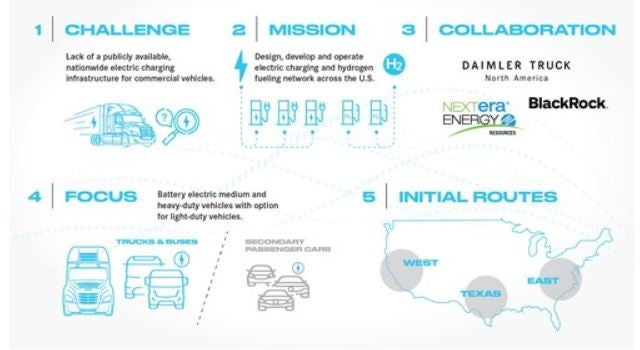Daimler Truck North America (DTNA), BlackRock Renewable Power and NextEra Energy Resources plan a $650 million joint venture to build charging infrastructure for electric and hydrogen fuel cell medium- and heavy-duty trucks, addressing a barrier to widespread adoption.
The new charging stations and hydrogen filling outlets are intended for commercial trucking, which is underserved in a transition to renewable energy that has seen public charging focused on cars and light trucks that require less energy and time to recharge.
The first phase of construction is expected to begin in 2023 on a network of charging sites on critical freight routes along the East and West coasts and in Texas by 2026. The plan is to leverage existing infrastructure and amenities while adding greenfield sites.
It was unclear if that includes travel plazas and truck stops, which truck stop trade organization NATSO and fuel marketer trade group SIGMA are lobbying to be the primary sites for electric charging under the federal Infrastructure Investment and Jobs Act. The groups are angling for grants to build charging stations at existing locations.
Electric island
Working with Portland General Electric, DTNA last April opened an electric island for truck charging near its headquarters in Portland, Oregon. The market-leading truck manufacturer will begin producing Class 8 Freightliner eCascadia and Class 6 eM2 trucks in Portland later this year.
“Our joint investment will act as a catalyst to make a carbon-neutral trucking industry a reality,” John O’Leary, DTNA president and CEO, said in a press release on Monday.

Unlike the more than 30,000 outlets in the Tesla Supercharger network, which work only for that manufacturer’s vehicles, the new network is open to all electric vehicles using predominant industry charging standards and communication protocols, O’Leary said.
DTNA has been conducting demonstrations in Southern California since early 2019 and has lent trucks to a variety of carriers and other customers for testing, accumulating more than 1 million miles of real-world driving in port drayage, pickup and delivery, and regional haul.
Green Bay, Wisconsin-based Schneider is getting 50 eCascadias in a joint cost-sharing program mostly funded by the California Air Resources Board and the California Energy Commission.
Most major truck manufacturers are moving ahead with production of battery-electric trucks, albeit in comparatively small numbers compared with about 250,000 diesel trucks solid in 2021.
‘Significant contributor to carbon emissions’
Daimler and its main rivals, Volvo and Traton, are spending $593 million to install and operate 1,700 charging stations for commercial trucks in Europe by 2027.
“The commercial transportation sector is a significant contributor to carbon emissions, and we firmly believe that decarbonization of transportation will be a critical societal focus for the next decade,” said David Giordano, global head of BlackRock’s Renewable Power Group, which is part of the world’s largest asset manager with $10 trillion under management.
BlackRock’s Renewable Power group invests across the spectrum of renewable power and energy transition supporting infrastructure globally, with more than $9.5 billion in more than 350 wind and solar projects as well as electric vehicle charging infrastructure and battery energy storage systems, across 15 countries on five continents.
The future joint venture, based on a memorandum of understanding, would design, develop, install and operate a nationwide, high-performance charging network for medium- and heavy-duty battery electric and hydrogen fuel cell vehicles. The initial funding of $650 million would be divided equally among the three parties.
NextEra Energy Resources is the world’s largest generator of renewable energy from the wind and sun. NextEra would contribute its eIQ Mobility software platform that quantifies the value and timing of fleet conversions and its decarbonization-as-a-service platform that helps fleets transition to zero-emission electric and hydrogen vehicles.
The FreightWaves Top 500 For-Hire Carriers list includes Schneider (No. 7).
Related articles:
Electric truck charging: Can infrastructure keep pace with demand?
Major truck manufacturers plan European electric charging network
Daimler’s electric trucks cross 1 million real-world driving miles










